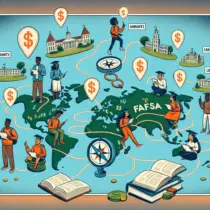Navigating the Landscape of Financial Aid for International Students in American Universities
Many international students dream of studying in American universities. However, funding their education can be a challenge. Understanding the various financial aid options available is key to pursuing higher education in the United States. This article aims to provide a comprehensive guide for international students navigating financial aid in American universities.
Types of Financial Aid for International Students
International students can access several types of financial aid. These include scholarships, grants, fellowships, and work-study programs. Scholarships and grants are ideal because they do not require repayment. Fellowships are usually merit-based and cover various expenses, such as tuition and living costs. Work-study programs allow students to work part-time while studying.
Scholarships Specific to Fields of Study
Certain scholarships target specific fields, such as STEM (Science, Technology, Engineering, and Mathematics) or public health. For example, the "Women in STEM Scholarship in USA, 2024" is specifically designed to support women pursuing degrees in STEM fields. This scholarship offers significant financial benefits and can greatly reduce the financial burden.
University-Specific Scholarships
Many American universities offer scholarships exclusively for their students. These scholarships can be need-based, merit-based, or a combination of both. Researching each university’s financial aid options is crucial. Universities like Harvard, MIT, and Stanford have generous financial aid packages for international students.
National and State Grants
National and state grants are generally harder for international students to obtain, but some exceptions exist. For example, international students may qualify for certain grants if they meet specific criteria, such as academic excellence or community involvement.
Scholarships and Grants for Specific Regions or Nationalities
Scholarships are often available based on the student’s country of origin. Organizations and governments frequently offer scholarships to citizens for study abroad. For example, the "Public Health Leadership Grant in France, 2025" provides funding for international students wanting to pursue public health degrees in American institutions.
Financial Aid from External Organizations
Various external organizations and foundations offer scholarships to international students. These organizations can be professional groups, non-profits, or multinational corporations. Researching and applying for these scholarships can take time, but the financial assistance offered can be substantial.
Loans and Deferred Payment Plans
While scholarships, grants, and fellowships are preferable, some students may need to consider loans. Certain American universities offer loans to international students, often requiring a co-signer who is a U.S. citizen. Deferred payment plans allow students to pay tuition fees in installments instead of lump sums. Although these options increase debt, they can make higher education more accessible.
Work-Study Programs
American universities often have work-study programs, which are a form of financial aid allowing students to work part-time while studying. These programs can help international students earn money to cover living expenses. It’s essential to check the visa regulations since not all visas allow you to work while studying.
Application Process for Financial Aid
Applying for financial aid involves several steps. First, students should research all available options. They should gather necessary documents like academic transcripts, standardized test scores, and recommendation letters. Writing a compelling personal statement can also be crucial. Applying early improves the chances of receiving aid.
Common Pitfalls and How to Avoid Them
Avoiding common pitfalls can improve the chances of receiving financial aid. One common mistake is not applying for enough scholarships. Applying widely increases the chances of securing funding. Another mistake is missing deadlines. Marking deadlines on a calendar helps ensure timely application submission.
Resources for Finding Financial Aid
Several resources are available to help find financial aid. University financial aid offices are an excellent starting point. Many universities have dedicated staff to assist international students. Online databases and scholarship search engines can also provide valuable information. Websites like Fastweb, Scholarships.com, and the College Board offer extensive databases of available financial aid.
Importance of Networking and Community Involvement
Networking and community involvement can significantly impact financial aid opportunities. Joining student organizations, attending university events, and connecting with professors can open doors to financial resources. Often, scholarships and grants value applicants who show community involvement and leadership skills.
Conclusion
Navigating the financial aid landscape for international students in American universities may seem daunting, but understanding the available options and resources can make the process manageable. Scholarships, grants, fellowships, and work-study programs offer various ways to fund education. By conducting thorough research, meeting application deadlines, and staying engaged in the community, international students can greatly enhance their chances of securing financial aid. The dream of studying in the United States is achievable with the right preparation and effort.






